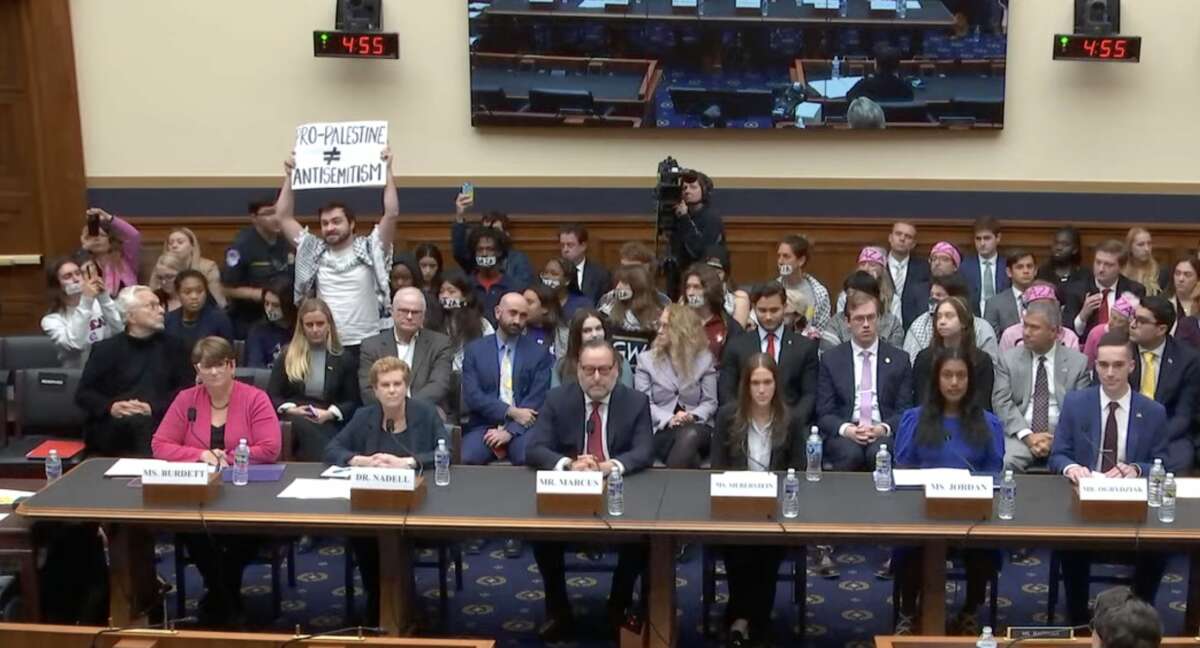Did you know that Truthout is a nonprofit and independently funded by readers like you? If you value what we do, please support our work with a donation.
The limits of the Republican-led U.S. House Judiciary Committee’s views on freedom of speech were on full display Wednesday shortly after a hearing on “Free Speech on College Campuses” began, when several pro-Palestinian rights demonstrators were removed from the hearing room and arrested for speaking out.
The committee, led by Rep. Jim Jordan (R-Ohio), invited representatives of conservative and pro-Zionist groups including Young Americans for Freedom and the Anti-Defamation League (ADL) to speak about what Jordan called “hostility towards certain points of view, in particular conservative points of view” amid growing outrage over Israel’s U.S.-backed assault on Gaza and the West Bank.
“With ‘safe spaces’ and ‘free speech zones’ aiming to protect students from violence,” Jordan said in his opening remarks, “one would think Jewish students would have somewhere to turn as violent, pro-Hamas students take to their demonstrations and have harmed students on college campuses. That’s not the case, as we will see in today’s hearing.”
But as the hearing got underway, protesters who were among the majority of Americans who support a cease-fire in the Israel-Hamas war currently raging in Gaza were promptly kicked out of the room for demanding that lawmakers consider how their speech has been suppressed since the war began.
One student demanded to know when speaking out against genocide “became antisemitism” as she reminded the committee that more than 4,200 children in Gaza have been killed by Israeli forces so far as Prime Minister Benjamin Netanyahu’s right-wing government continues to insist it is targeting Hamas in retaliation for the group’s October 7 attack on southern Israel.
“What is your right to speech if all of us are not free?” asked the protester as she was pulled out of the room by Capitol Police.
The Hill reported that 10 demonstrators were arrested after interrupting the hearing to say “Free Palestine,” “Free Gaza,” and “End the siege and the occupation now.”
Journalist Dima Amro reported that police confiscated the protesters’ keffiyehs and took them to the Capitol Police headquarters.
Jordan cited a “nearly 400% increase in antisemitic incidents, including harassment, vandalism, and assault” in the two weeks after the Hamas attack, but did not mention that the nation’s largest Muslim civil rights group, the Council on American-Islamic Relations, reported that anti-Muslim violence and harassment reports tripled in October.
Despite their focus on free speech on college campuses, Republicans on the committee also did not appear disturbed by a call by the ADL and Louis D. Brandeis Center for Human Rights Under Law — both of which were represented at the hearing — for universities to investigate campus chapters of Students for Justice in Palestine (SJP).
The groups accused SJP of “celebrating terrorism” and said it should be investigated for potentially “providing material support to Hamas.”
Last week, the ACLU expressed its strong opposition to “any efforts to stifle free speech and association on college campuses, and urged universities to reject calls to investigate, disband, or penalize pro-Palestinian student groups for exercising their free speech rights.”
“We recognize that colleges and universities are managing heightened threats and anguished tensions on their campuses while trying to keep students safe — and we take those concerns seriously,” said Anthony D. Romero, executive director of the ACLU. “The devastating conflict in Israel and Palestine has embroiled campuses here at home, sometimes resulting in speech that includes terms we vehemently disagree with or even find offensive and repugnant. Yet it’s precisely in times of crisis and fear that university leaders must remain firm in their commitment to free speech, open debate, and peaceful dissent on campus.”
“A blanket call to investigate every chapter of a pro-Palestinian student group for ‘material support to terrorists’— without even an attempt to cite evidence — is unwarranted, wrong, and dangerous,” Romero added. “It echoes America’s mistakes during the McCarthy era and is counterproductive. We urge college and university leaders to hold fast to our nation’s best traditions and reject proposals to restrict constitutionally protected speech.”
At the hearing Wednesday, one demonstrator told the committee that “Palestinian students deserve to speak on the genocide of their families” and called for lawmakers and universities to “stop silencing Palestinian students.”
Jordan’s hearing also follows the spreading of misinformation about pro-Palestinian rights demonstration at the University of California, Los Angeles and other schools where students chanted, “Israel, Israel, you can’t hide: We charge you with genocide!” Social media users claimed the protesters were calling for a “Jewish genocide.”
On Tuesday, Jordan and nearly all other House Republicans were joined by 22 Democrats in voting to censure Rep. Rashida Tlaib (D-Mich.), the only Palestinian-American member of the House, for her defense of the phrase “from the river to the sea, Palestine will be free,” which is commonly used at Palestinian rights protests.
“You are not offering a plurality of opinion,” one protester told Jordan, “you are offering partisanship, and you are offering murder to more Gazans.”
Trump is silencing political dissent. We appeal for your support.
Progressive nonprofits are the latest target caught in Trump’s crosshairs. With the aim of eliminating political opposition, Trump and his sycophants are working to curb government funding, constrain private foundations, and even cut tax-exempt status from organizations he dislikes.
We’re concerned, because Truthout is not immune to such bad-faith attacks.
We can only resist Trump’s attacks by cultivating a strong base of support. The right-wing mediasphere is funded comfortably by billionaire owners and venture capitalist philanthropists. At Truthout, we have you.
Truthout has launched a fundraiser, and we have only 24 hours left to raise $17,000. Please take a meaningful action in the fight against authoritarianism: make a one-time or monthly donation to Truthout. If you have the means, please dig deep.
